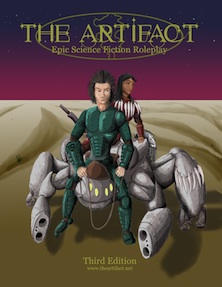 This question has tripped me up when introducing RPGs to new players. My normal answer is something along the lines of “Well you don’t really win, you progress. . . ” and then I explain getting more stuff and experience. Almost every time, as soon as I get to “Well you don’t” there’s a bit of a shock on their face and that blank stare that says “I’ve lost interest.”
This question has tripped me up when introducing RPGs to new players. My normal answer is something along the lines of “Well you don’t really win, you progress. . . ” and then I explain getting more stuff and experience. Almost every time, as soon as I get to “Well you don’t” there’s a bit of a shock on their face and that blank stare that says “I’ve lost interest.”
As you may have noticed, I think that introducing RPGs is an art that we as a community are routinely under skilled in (a.k.a. we stink at it). This is just one aspect of the process of that introduction. Getting new people into RPGs is a sales process. I’m not a natural salesman so I really have to think about what I’m doing to get it right. One important concept of selling is solving a problem. If you can offer a product that solves a problem you have a sale. “You don’t win” doesn’t solve a problem it introduces one and that’s how they’re interpreting it. One thing to keep in mind is that sometimes you can solve a problem that the person didn’t know they had, you just have to convince them that they had a problem in the first place.
So how can you solve the potential player’s problem? I’m not interested in making up some random reason, I enjoy playing so there has to be something that it does for me. That something is winning. It’s a different kind of winning than a board game but each session is something like winning a video game. There’s a problem, a challenge and then a resolution (hopefully) in most sessions. Yes there are sessions and maybe even whole games that don’t follow that but it’s the default for RPGs. But that’s not good enough. Saying it’s like a video game means to the prospective player that they might as well stick to their video games because it’s what they know. They already have a solution to the problem, there’s no reason to have two tools that do the same thing.
Most RPG players will agree, playing an RPG is not the same as playing a video game. So how do you explain that difference? One point is that it’s because an RPG is a collaborative game. Instead of playing against each other you’re working together. But . . .
MMOs can be collaborative too and with voice chat you get to “hang out” with your friends, so why not just leave all the reading and the math and stick with the shiny graphics and sound? There has to be something else that separates table top and MMO. You could say that in a table top RPG you really get to know your friends but that would more than likely scare off people. Why? People are afraid that their friends will really get to know them, and because you know how the game is played you’ll have the upper hand.
I can only give an illustration to explain the difference between table top and MMOs and it goes like this. “When you want to talk to a friend, talking over the phone is okay but you’d rather be hanging out face to face. That’s the difference between table top and MMO. Even if you’re in the same room on the computer, you lose that personal connection.” Maybe connection is the right word then? Yes there is the aspect of the Game Master making the game more interesting but they’re not going to understand that, not really.
Put it all together
So when a prospective player asks how they win I’m going to say something like “You win by working together with the other players to beat a situation that the Game Master presents. It can be almost anything so it’s exiting to find out what it will be. Because you’re working with the other players, you get to connect with them and be a team so most of the time they’ll be helping you win. It’s challenging, social and fun.”
How will you tell a new player how they can win? Sound off in the comments.


 The Free RPG Blog
The Free RPG Blog
You win by bringing the awesome and making the story better for everyone.
Emphasizing the difference between MMOs and RPGs during the “How do you win?” phase is probably over-reaching. In fact, answering the question with “Exactly how you ‘win’ in WoW” is probably a good answer for a lot of people. You then have a follow-up ready, to point out the other benefits of a tabletop RPG (deeper characters, in-person socialization, infinite options, personalized responses, etc.).
It’s actually really nice that there are now a number of video games, and even board games, that have the same vague and open-ended “victory” conditions as RPGs. When your comparisons used to be chess, poker, and Monopoly, it was a much harder hurdle to overcome.
I am throwing in a bit of why should they bother playing. In a way I see it as a benefit to playing and therefore more of “What do I get out of playing?” but in practice “How do you win?” carries something of that idea.
So a stretch? Yes. Useful for selling a new player? I think so, so I’ll go with it.